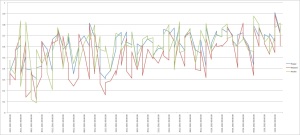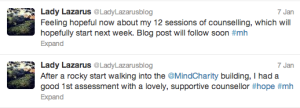Two weeks ago, I went to see the GP about my mental health for the first time in 7 years and I decided to audio record the interview. I was conscious that my memory of what happened would be influenced by my experience of it, so I wanted a more objective record of exactly how it went. And I wanted to be able to share it here, to give a better account of how it happened. This is my experience, not necessarily a representation of the service anyone else would get from a doctor in their local NHS practice, but it’s one example.
—————————————————————————————————————————
GP: Hi, come in.
Me: Hi.
GP: Hi, take a seat. [inaudible].
Me: Um. [pause]. I’ve had low mood for about 18 months now and I’m just a bit tired so [laughs], I thought I’d come to the GP and talk about it and see if there’s anything I can do.
GP: Okay. So what’s been going on?
Me: Um [sighs]. I don’t know if there’s anything in particular that’s been going on, it’s just, um [pause], yeah, I dunno, it’s just kind of [pause] continuous, so I don’t know [laughs].
GP: Right.
Me: It kind of goes up and down and it’s not as bad as it has been, but…
GP: Hmm.
Me: Um, I think, last time I came to the GP it was a while ago…
GP: Yep.
Me: I was going to talk about it then but I didn’t feel able to…
GP: Right.
Me: So it’s taken me a while to come back.
GP: Okay, right.
Me: Um. [pause] I’ve had depression in the past but that was quite a while ago.
GP: Okay. Were you on medication?
Me: Yeah. I was on Zoloft, and then on Citalopram.
GP: Okay. And how long was the treatment for?
Me: Um, it was probably, I think I was on it for a couple of years.
GP: Right, okay. And then did you finish the last treatment?
Me: Um, it was 2005.
GP: 2005?
Me: Yeah, a long time ago.
GP: So you’ve been okay since then?
Me: Yeah, ah, yeah, I’ve been okay, yeah. I was fine for a long time and so, yeah.
GP: Okay. So when did this current low mood start?
Me: Um, about 18 months ago.
GP: And ah, are you able to sleep okay?
Me: Um, it, it comes and goes. It’s not so bad at the moment, but it, sometimes it, I’ll wake up in the night. Like I’m fine falling asleep, but it’s just that I wake up quite early.
GP: Right, okay. So how many hours of sleep would you say you get?
Me: Um. At the moment it’s okay, I’m getting about 7 hours of sleep at the moment…
GP: Right, okay.
Me: But other times it will be 4 or 5.
GP: Right, okay. And your appetite?
Me: Appetite is fine.
GP: [inaudible]
Me: Ah, I have lost a bit of weight, but I think that’s just because I’ve been exercising.
GP: Okay, okay. Right. And any thoughts of self harm?
Me: Ah [pause]. I think about it but it’s not something I’m doing.
GP: Right. How often do you think about it?
Me: [pause] Um. Quite a lot, like it’s always sort of there, but I.
GP: Okay, right. But you haven’t got, haven’t got any kind of plans or anything? No? Okay. But have you self harmed, cut yourself or…?
Me: I have in the past, but not this time.
GP: Not now, okay. Are you in a relationship currently?
Me: Yes.
GP: And does he support you?
Me: Yeah. I’ve spoken to my partner about it, but only recently.
GP: [inaudible] right. Now, how are your energy levels?
Me: Not great [laughs]
GP: Right.
Me: I’ve just got that feeling of being kind of heavy, all the time.
GP: Right, yeah, okay. Are you enjoying things you normally enjoy, like going out with friends and things?
Me: Not really. Like, yeah [pause]. Not as much as, everything’s just more of an effort.
GP: Right, okay, okay.
Me: [inaudible]
GP: And alcohol?
Me: Um, I’ve been managing it, it’s not too, yeah. I probably should drink less.
GP: Ah okay, right. Drugs…?
Me: No.
GP: Smoking?
Me: Oh smoking, yeah.
GP: Right, okay. Now, um, the other thing is that obviously, you know, with a history of depression and the way you are feeling as well, I think you would know [inaudible]. Now compared to the last time you started on medication…
Me: Yeah?
GP: Do you think you are feeling the same or getting towards feeling, you know, the same again?
Me: Um [pause], yeah, it’s pretty similar.
GP: Okay. Did you have any counselling or…?
Me: Yeah.
GP: You did? Okay, right. Did you find it helpful?
Me: Um [pause]. Not [pause] hmm. I, well, I had counselling and then I was referred to a psychiatrist as well…
GP: Right.
Me: It [pause]. Yeah. I think I would like counselling again, but I didn’t have a very good relationship with my psychiatrist.
GP: Right, okay. Yes. Now, with the counselling, we can refer you to our psychologist.
Me: Mmm.
GP: And the waiting period is normally a couple of months or something.
Me: Okay.
GP: But then there’s a, a place called Mind.
Me: Yeah, I know Mind.
GP: Then they can give you, you know [inaudible]. And they charge, I think it’s £5 a session.
Me: Okay, so it’s not expensive.
GP: So I can actually give you their number, and then if you would like I could [inaudible] probably you can do…
Me: Right, okay. I might give Mind a go.
GP: Yes, you’ll get in quicker.
Me: What sort of counselling is it?
GP: Ah, I think it’s one-on-one, yeah [inaudible] they decide the number of sessions you need to do, and then in combination with that kind of treatment I think maybe we’ll start you on some antidepressants as well.
Me: Okay.
GP: Because the last time we saw you was May last year, and if at the time you were having these issues and you couldn’t talk about it and it’s still the same now, then I think we should start you on some Citalopram maybe?
Me: Okay.
GP: But it depends on you, if you want to give the counselling a go first or whether…
Me: Yeah.
GP: …or do you want to, it depends on how you feel, you know?
Me: Yeah.
GP: The thing is, I think that you are probably moderately depressed.
Me: Mmm.
GP: And drug treatment may be beneficial.
Me: Yeah. I suppose I’m not quite sure about antidepressants, I’m sort of [pause]. Yeah. Are they really effective or not, you know?
GP: Yeah they are, they are. Because for somebody who’s had depression in the past, sometimes there could be a physiological reason, or an underlying cause for it.
Me: Yeah.
GP: And it’s due to the seratonin production. Sometimes, for some reason it does not produce enough, and if it does not produce enough, there’s nothing you can do. You can try everything to lift up your mood, but it still doesn’t [inaudible]. Your body for some reason doesn’t produce enough serotonin, so therefore when you do take the medication it stops the breakdown of seratonin and therefore you take that and it elevates the mood. So it will help. The thing is, ah, [pause] you know that people, some people think, oh well it’s…
Me: It’s not a happy pill!
GP: Yeah. But we find, it depends [inaudible] initially it takes about two weeks for it to kick in and then it starts to accumulate and then the way that people realise that, you know, its effect, is when they stop.
Me: Yeah.
GP: Sometimes they’ve been taking it for a while and they’re feeling alright and then they stop and when they start getting depressed again they know, that’s when they realise it was working.
Me: Yeah.
GP: So it’s a slow, you know, kind of treatment. It takes time to build it up. But it depends if you want to give Mind a go first, or whether you want to start, you know, on the antidepressants.
Me: Um. And Mind, they usually don’t have a waiting time, is that?
GP: Ah, I think, Mind’s probably shorter than our psychologist. A week or two.
Me: Ah, okay.
GP: So if you like, you can wait and see them, that would be fine.
Me: And do they have, do you know, do they have appointments only in office hours, or..?
GP: I think probably. I think it’s probably that, 9 to 5. I mean you’ll find all the psychologists will be in office hours.
Me: Yeah. It’s a bit hard for me.
GP: Yeah.
Me: I don’t like, telling people at work that…
GP: Yeah. So that’s what it is. Now ah, it’s entirely, I think you know maybe the antidepressants are [inaudible]. Because you’ve got a strong history, a past history of depression, I think you know you may benefit from, ah, [inaudible].
Me: Mmm. [pause] Can I take a prescription and then…
GP: Yeah, I can give you a prescription now, start you out on the lowest dose, and then I’d like to see you in a couple of weeks time.
Me: Okay.
GP: And see how you’re getting on [inaudible].
Me: Yeah, okay. Thank you.
[GP typing]
GP: Are you on the pill?
Me: No. I’ve got the coil.
GP: Ah, okay. And how are your periods?
Me: Yeah, they’re fine.
GP: Not heavy at all?
Me: No, they are. But it’s been like that since I got the coil.
GP: Mmm, riiight. Because you look a bit pale to me, you know, you may have anaemia or…
[checks my eyes]
GP: Are you feeling more tired than usual?
Me: Yeah.
GP: I think we’ll just get a blood test done to check your iron levels.
Me: Okay.
GP: Because sometimes a combination of factors, you know, can actually affect your mood. You know, being tired already from iron deficiency, and that can also make your mood a bit lower.
Me: Mmm, okay.
[GP writing]
GP: And how’s your self esteem? Your confidence?
Me: Mmm, could be better [laughs]
[GP typing]
GP: Do you know which antidepressants you were on in the past?
Me: Yeah, I was on Zoloft to start with, then I changed to Citalopram.
GP: Right, okay.
[GP printing prescription]
GP: Now the Citalopram is one a day. If you take it during the day and you feel, you know, a bit tired, then take it in the evening.
Me: Okay.
GP: And then let me get you the number for Mind.
[pause]
GP: [inaudible]
Me: Okay
GP: That’s the Citalopram, 10mg is the lowest dose, and I will see you in a couple of weeks.
Me: Okay, alright, thank you.
GP: Okay
[inaudible short conversation as I’m getting up to leave]



